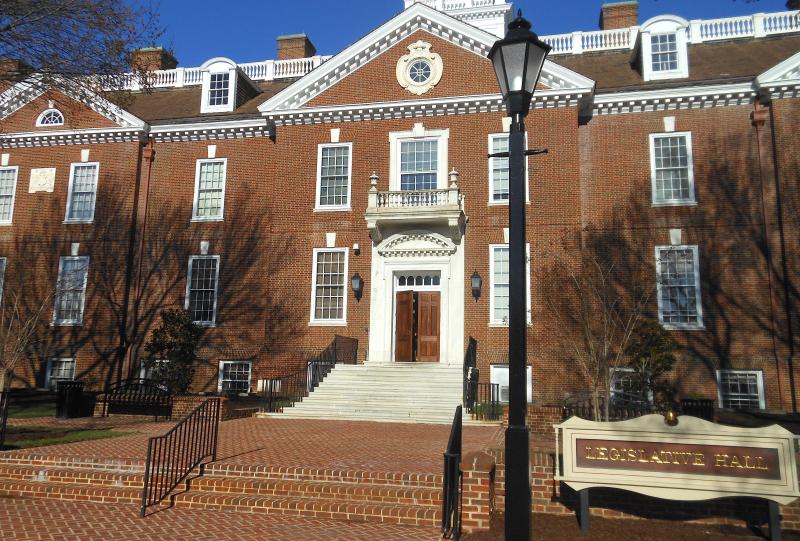Gov. John Carney submitted his first budget March 23, and to close a $386 million shortfall, he said he’s taking a 50/50 approach to budget reduction and increasing revenue.
The goal is to be balance with shared sacrifices, said Carney. This was something heard again and again, he said, during his budget reset meetings across the state.
Carney’s $4.1 billion budget is similar to the one submitted by former Gov. Jack Markell in the days before Carney was sworn into office.
There are differences, starting with the shortfall. When Markell submitted his budget, the shortfall was $350 million, but a March 20 report from the Delaware Economic and Financial Advisory Council increased the shortfall to $386 million when expected revenues fell short.
Through changes in the franchise, personal income, realty transfer and cigarette taxes, Markell proposed to raise $212.2 million in revenue. He also proposed reductions in grants-in-Aid, employee and retiree healthcare plans and agency personnel. He also called for eliminating a senior property tax subsidy.
Carney’s proposal generates nearly $200 million in new revenue by increasing taxes – corporate franchise, personal income and on tobacco-related products. Notably absent are any changes to the realty transfer tax. There are also reductions in state spending including a 4.5 percent reduction of discretionary funds for all state agencies, a $22 million reduction in the Educational Sustainment Fund, and $15 million reduction in school district and charter school operations.
Carney said rising school enrollments – almost 22,000 new students over the past decade – and rising Medicaid costs are the primary issues driving up the cost of government.
Department of Finance Secretary Rick Geisenberger said the revenue proposal calls for changes at all levels, but it does ask those who are most able to pay, to pay a little more.
As proposed, itemized deductions would be eliminated for the personal income tax, but the standard deduction would increase by more than 50 percent: for an individual it increases from $3,500 to $5,000; for a couple it’s $6,500 to $10,000. It’s a fairly dramatic increase, said Geisenberger.
The budget also outlines an increase in each tax bracket of the personal income tax from .2 percent to .4 percent, and the eligibility age for additional personal credits and retirement income exclusions would increase from 60 to 65 in one-year increments.
For the corporate franchise tax, the proposal creates a second-tier maximum tax of $250,000 for companies with no less than $250 million in revenue and assets, and increases the first-tier maximum by $20,000, from $180,000 to $200,000, to reflect inflation since the last increase in 2009.
The corporate franchise tax for small mom-and-pops and LLCs will be left alone, said Secretary of State Jeffrey Bullock.
Carney’s proposal includes $16 million in new revenue from a $1 increase in the tax on cigarettes, from $1.60 a pack to $2.60, and an increase from 15 percent to 30 percent on other tobacco products, which would now also include moist snuff and e-cigarettes.
Geisenberger said these increases are aimed at reducing tobacco use, and also bring Delaware’s level of taxing in line with surrounding states. The tax will be a little higher than Maryland, but less than New Jersey and Pennsylvania, he said.
Continuing the recent trend, there is no funding for open space or farmland preservation funds or for the energy efficiency fund. Together, this saves $25 million.
The proposal does touch the senior property tax subsidy, but instead of eliminating it, as Markell did, Carney is reducing the maximum allowable amount by $100, from $500 to $400. Office of Management and Budget Director Mike Jackson said this is expected to save $5 million.
Not included as a revenue source is the legalization and taxation of marijuana, despite it being frequently discussed during Carney’s budget reset meetings. During a March 2 meeting in Lewes, he said it was the one topic that had been discussed during all previous budget meetings.
Carney said he was against the legalization of marijuana at this point, but he said he’s committed to holding a town hall-style meeting with legalization advocates.
Also not included is the capital improvement budget. Jackson said there would be one coming in the next few weeks.
Moving forward, Carney said these proposals will not be introduced as a piece of legislation taking the place of the bill Markell introduced in January. Instead, he said, these proposals will be introduced as amendments to the earlier bill.
The final day of the session is June 30.
Chris Flood has been working for the Cape Gazette since early 2014. He currently covers Rehoboth Beach and Henlopen Acres, but has also covered Dewey Beach and the state government. He covers environmental stories, business stories and random stories on subjects he finds interesting, and he also writes a column called Choppin’ Wood that runs every other week. He’s a graduate of the University of Maine and the Landing School of Boat Building & Design.























































